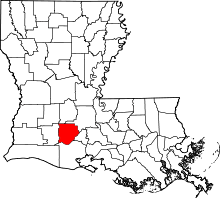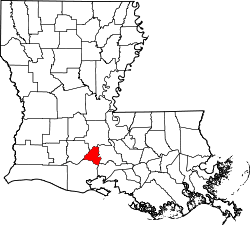Duson, Louisiana
| Duson, Louisiana | |
|---|---|
| Town | |
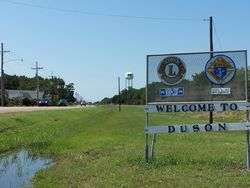 Downtown Duson | |
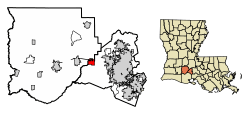 Location of Duson in Acadia and Lafayette Parishes, Louisiana. | |
.svg.png) Location of Louisiana in the United States | |
| Coordinates: 30°14′11″N 92°11′06″W / 30.23639°N 92.18500°WCoordinates: 30°14′11″N 92°11′06″W / 30.23639°N 92.18500°W | |
| Country | United States |
| State | Louisiana |
| Parish | Acadia, Lafayette |
| Area[1] | |
| • Total | 3.12 sq mi (8.09 km2) |
| • Land | 3.11 sq mi (8.06 km2) |
| • Water | 0.01 sq mi (0.02 km2) |
| Elevation | 36 ft (11 m) |
| Population (2010) | |
| • Total | 1,716 |
| • Estimate (2016)[2] | 1,754 |
| • Density | 563.44/sq mi (217.56/km2) |
| Time zone | UTC-6 (CST) |
| • Summer (DST) | UTC-5 (CDT) |
| Area code(s) | 337 |
| FIPS code | 22-22255 |
| Website |
townofduson |
Duson is a town in Acadia and Lafayette parishes in the U.S. state of Louisiana. The population was 1,716 at the 2010 census.[3] The town was named after Curley Duson, a legendary sheriff of St. Landry Parish
The Lafayette Parish portion of Duson is part of the Lafayette Metropolitan Statistical Area, while the Acadia Parish portion is part of the Crowley Micropolitan Statistical Area.
History
Originally known as "Duson Station", the town was laid out by J.G. Parkerson, general manager of the Louisiana Western Railroad. By August 30, 1880, the railroad line from New Orleans to Houston was completed, and passenger and freight service began. It merged with the Southern Pacific Railroad in 1900. The village of Duson was incorporated on December 16, 1909, named after the land developer Curley Duson, and installed Adolph De Jean as the first mayor.
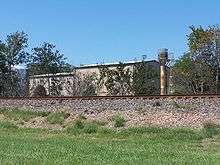
In 1927, St. Theresa Catholic Church was completed. Cotton farming was the main agriculture for the area. Three cotton gins were in Duson until the mid-1960s. Fires destroyed two and the third was torn down.[4] After World War II, small lots east of Duson were developed, with small houses using brick siding paper on the exterior. Because of that, the area became known as "Paper Town."[5]
Geography
Duson is located at 30°14′29.27″N 92°11′3.91″W / 30.2414639°N 92.1844194°W (30.241464, -92.184419).[6]
According to the United States Census Bureau, the town has a total area of 2.8 square miles (7.2 km2), of which 0.0077 square miles (0.02 km2), or 0.32%, is water.[3]
Demographics
| Historical population | |||
|---|---|---|---|
| Census | Pop. | %± | |
| 1910 | 120 | — | |
| 1920 | 192 | 60.0% | |
| 1930 | 396 | 106.3% | |
| 1940 | 463 | 16.9% | |
| 1950 | 707 | 52.7% | |
| 1960 | 1,033 | 46.1% | |
| 1970 | 1,199 | 16.1% | |
| 1980 | 1,253 | 4.5% | |
| 1990 | 1,465 | 16.9% | |
| 2000 | 1,672 | 14.1% | |
| 2010 | 1,716 | 2.6% | |
| Est. 2016 | 1,754 | [2] | 2.2% |
| U.S. Decennial Census[7] | |||
As of the census[8] of 2000, there were 1,672 people, 644 households, and 452 families residing in the town. The population density was 651.4 people per square mile (251.2/km²). There were 724 housing units at an average density of 282.1 per square mile (108.8/km²). The racial makeup of the town was 73.98% White, 25.24% African American, 0.06% Native American, 0.06% from other races, and 0.66% from two or more races. Hispanic or Latino of any race were 0.36% of the population.
There were 644 households out of which 38.2% had children under the age of 18 living with them, 41.6% were married couples living together, 20.5% had a female householder with no husband present, and 29.7% were non-families. 25.3% of all households were made up of individuals and 8.9% had someone living alone who was 65 years of age or older. The average household size was 2.59 and the average family size was 3.07.
In the town, the population was spread out with 30.0% under the age of 18, 10.5% from 18 to 24, 29.3% from 25 to 44, 19.6% from 45 to 64, and 10.6% who were 65 years of age or older. The median age was 32 years. For every 100 females, there were 93.3 males. For every 100 females age 18 and over, there were 85.1 males.
The median income for a household in the town was $21,071, and the median income for a family was $24,886. Males had a median income of $26,250 versus $15,476 for females. The per capita income for the town was $10,520. About 27.5% of families and 31.5% of the population were below the poverty line, including 42.7% of those under age 18 and 29.5% of those age 65 or over.
Festivals
Like many other towns and cities in the Acadiana region, Duson has a local Mardi Gras celebration that includes a parade through the town. Many residents of nearby Lafayette, Scott and Rayne will converge on the town, as most parades in the region are scheduled as to not occur simultaneously.
References
- ↑ "2016 U.S. Gazetteer Files". United States Census Bureau. Retrieved Jul 2, 2017.
- 1 2 "Population and Housing Unit Estimates". Retrieved June 9, 2017.
- 1 2 "Geographic Identifiers: 2010 Demographic Profile Data (G001): Duson town, Louisiana". U.S. Census Bureau, American Factfinder. Retrieved May 14, 2013.
- ↑ Jessie L. Stoute, "Duson History" Archived 2007-08-23 at the Wayback Machine.; Town of Duson
- ↑ www.carencrohighschool.org "Duson named for town-building promoters" Archived 2007-10-03 at the Wayback Machine.
- ↑ "US Gazetteer files: 2010, 2000, and 1990". United States Census Bureau. 2011-02-12. Retrieved 2011-04-23.
- ↑ "Census of Population and Housing". Census.gov. Archived from the original on May 12, 2015. Retrieved June 4, 2015.
- ↑ "American FactFinder". United States Census Bureau. Archived from the original on 2013-09-11. Retrieved 2008-01-31.
